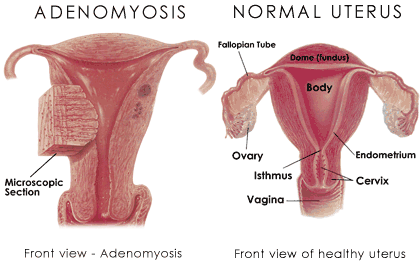Adenomyosis
Adenomyosis
Adenomyosis
What is Adenomyosis?
Adenomyosis is a condition characterized by the presence of endometrial tissue, which normally lines the inside of the uterus, growing into the muscular wall of the uterus (myometrium). This invasion of endometrial tissue into the muscle layer can lead to inflammation, enlargement of the uterus, and painful symptoms. While the exact cause of adenomyosis remains unclear, several factors may contribute to its development, including hormonal imbalances, previous uterine surgery (such as cesarean section), and inflammation within the uterus.
Recognizing the Symptoms
- Heavy or prolonged menstrual bleeding
- Severe menstrual cramps (dysmenorrhea)
- Pelvic pain or discomfort, particularly during menstruation
- Pain during intercourse
- Enlargement of the uterus
- Irregular bleeding between periods
These symptoms can significantly impact a woman's quality of life, leading to discomfort, fatigue, and emotional distress.
Diagnosis and Treatment
Diagnosing adenomyosis often involves a combination of clinical evaluation, imaging studies, and sometimes, surgical intervention. While a pelvic exam may reveal an enlarged or tender uterus, imaging tests such as ultrasound, MRI, or transvaginal ultrasound are often used to visualize changes within the uterine wall.
Treatment for adenomyosis aims to alleviate symptoms and improve quality of life. Depending on the severity of symptoms and the woman's reproductive goals, treatment options may include:
- Pain management: Over-the-counter pain relievers, such as nonsteroidal anti-inflammatory drugs (NSAIDs), may help alleviate menstrual cramps and pelvic pain.
- Hormonal therapy: Birth control pills, hormonal IUDs, or other hormone-based medications may help regulate menstrual cycles and reduce heavy bleeding and pain associated with adenomyosis.
- Minimally invasive procedures: In some cases, minimally invasive procedures such as endometrial ablation or uterine artery embolization may be considered to alleviate symptoms.
- Hysterectomy: In severe cases or for women who have completed their families, surgical removal of the uterus (hysterectomy) may be recommended to provide definitive relief from adenomyosis symptoms.
Conclusion: Seeking Support and Solutions
Adenomyosis is a challenging condition that can have a significant impact on a woman's physical and emotional well-being. If you experience symptoms suggestive of adenomyosis, it is important to consult with a healthcare provider for evaluation and diagnosis. With proper management and support, women with adenomyosis can find relief from their symptoms and reclaim their health and vitality.
Complex uterine adenomyosis surgeries require a high level of expertise and precision to ensure optimal outcomes for patients. As a surgeon specializing in this field, I have undergone extensive training and have honed my skills to effectively tackle even the most challenging cases.
One of the most common surgical procedures for treating uterine fibroids is a adenomyomectomy. During this procedure, the adenomyotic tissue is surgically removed while preserving the uterus, which is particularly important for women who wish to preserve their fertility.
In some instances, a hysterectomy – the surgical removal of the uterus – may be recommended, especially for women who have completed their families or whose symptoms are severe and unresponsive to other treatments. While a hysterectomy is a major surgery, advancements in surgical techniques have made it safer and less invasive, with shorter recovery times.
Before recommending surgery, I always take the time to thoroughly evaluate each patient's unique situation, considering factors such as the size, location of the adenomyotic tissue, as well as the patient's age, reproductive goals, and overall health.
I believe in a personalized approach to care, and I work closely with each patient to develop a treatment plan that is tailored to their specific needs and preferences. Throughout the surgical process, my priority is always the well-being and comfort of my patients. I strive to provide compassionate, comprehensive care from the initial consultation through post-operative follow-up. I understand that undergoing surgery can be a daunting prospect, and I am committed to supporting my patients every step of the way, answering their questions, addressing their concerns, and ensuring they feel informed and empowered throughout their treatment journey.

